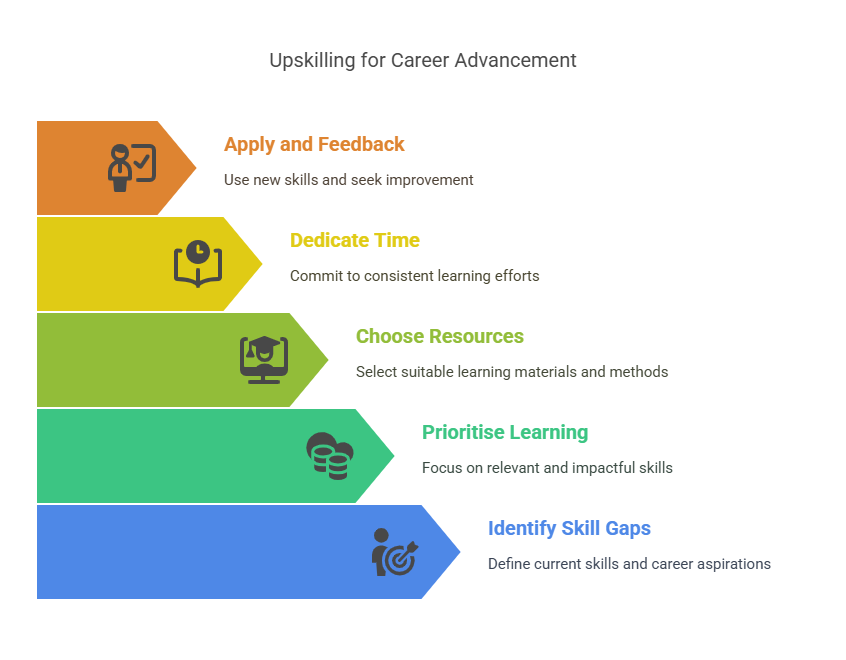As we arrive at the year's midpoint, you may contemplate all the wonderful things the remainder of 2025 could have in store. A new season could signal the perfect opportunity to review the last six months and consider what you want to achieve next, so here are five ways to upskill your career in 2025.
Whether you’re interested in the next twelve months or are thinking about where you want to be in five years, why not take the opportunity to make a plan to upskill your career? A great place to start is taking a GCSE subject in an area you're interested in; these are widely recognised qualifications. If you already have the relevant GCSEs, take a look at the prospective A-level courses.
What does upskill mean?
Upskill, is a fancy word for learning something new that you can use in your daily job or life. There are many ways you can upskill, including investing in learning both hard and soft skills that will be useful in your career. The route you go down will be based on what you’re hoping to achieve and your overall career plan.
Why should you upskill yourself?
There are multiple reasons you might be interested in career development, but five ways to upskill your career include:
Improving workplace performance
Every role you take on should come with professional development opportunities. So, if you've found a skills gap in the department you work in and are interested in volunteering to fill that gap, you could put in a request to upskill.
Perhaps you're seeing amazing things happening in your industry and want to bring them on board at your current company.
Digital upskilling, for example, is something a lot of companies across most niches are investing in. So perhaps you want to be upskilled in that area, and then once your employers see your increased performance, they'll implement digital upskilling across the board.
Upskilling to improve workplace performance benefits the company you work for since they won't have to hire somebody who has the knowledge required to plug the gap. It'll also be another quiver in your bow, leading to more experience that you can take with you into your next job.

Passion for your industry
If you're already in an industry you love, then you'll naturally be interested in what's changing and how you can get involved. Perhaps there's been a shift, or something new has been discovered that really interests you. Upskilling is a way to carve out dedicated time to learn everything there is to know.
Pay rise
A common reason to upskill is as a means to a pay rise. Of course, you'd have to discuss this with your employer to get them on board first and agree on whether you'll be upskilling on work time or out of hours; but it's a legitimate way to increase your annual salary without having to take on a promotion.
This is an excellent option if you love your job and don't want to move out of the position you're in, but do want to be reimbursed for your knowledge and ability.
Promotion
We've just touched on this briefly, but another reason you might choose to upskill is to be eligible for a promotion or stand you in good stead to get a job at a level above the one you're already working at when it's time to move on.
Career changes
Finally, not all upskilling is associated with moving 'up' either a position or pay grade. For example, if you're in a job or industry that doesn't excite you anymore, you may choose to upskill so that you can shift into an entirely different career.
This may be one of the most challenging pathways to take, but it isn't impossible. At Oxbridge, we specialise in helping people successfully change careers and move from a job they hate to a job they love. It's never too late to start fresh. Whether you've got 30 years before you hope to retire or ten, why not make them the best years of your professional career?
Perhaps your dream career requires a university degree; in that instance, you can take steps to make yourself more desirable to further education providers. For example, you can take a GCSE course to meet minimum education requirements or complete a foundation course in the subject you want to study to prove you have enough understanding to handle the material. By studying online, you can progress toward your dream career at your own pace without having to quit your job.
Five ways to upskill your career in 2025
Whatever the reason you want to upskill, the next step is to understand how to go about it and figure out which option will work best for you.
Below, we've outlined five ways you can upskill; some may seem simple but could have fantastic benefits, whereas others may take a little more time and dedication before you reap the rewards.
- Sign up for industry newsletters
Every industry has its thought leaders; whether it's big businesses or small consultants, many people are eager to share their knowledge.
By signing up for newsletters, you can start work every morning by browsing through in-depth articles sent straight to your inbox. You can choose which ones you want to read and discard those you don't. This is an excellent way to learn new things without really feeling like you're learning anything at all.

- Invest in formal training and study
This is a fantastic option if you’re already working in an industry you love or are looking to move into a new career entirely.
For the former, you can often get some financial assistance from your employer, particularly if you have tangible evidence of how it will benefit the company.
Whereas, if you're looking to change careers entirely, it may not be a conversation you're ready to have with your higher-ups yet. Not to worry though, there are tons of ways you can fund your learning to make your dream a reality as soon as possible.
You can take courses such as GCSEs or A-levels that dig deeper into knowledge you already have, learn a new skill entirely or hone softer skills like effective communication that will improve your daily performance.
- Attend industry events (learning and networking)
This is something else your employer might be willing to pay for, so long as you can prove the benefits of their investment.
You have a front-row seat to the latest data and knowledge driving your industry forward by attending industry conferences. You'll likely come out of an event buzzing with things you want to try out at work as soon as possible.
In addition to providing advice and how-to's that you can take back to your workplace, it's also an incredible networking opportunity. And that buzz you get from being surrounded by people who work in the same niche as you and love it, there's nothing quite like it.
- Follow businesses you admire (and their staff) on social media
If there's a particular company doing amazing things and disrupting your industry, connect with them online. That's quite literally what LinkedIn was made for. You can also use LinkedIn to find people who work in that company and follow them. Connecting with them on Twitter is another option.
This is a super-easy way to keep track of what they're up to professionally, allowing you to comment on their posts with questions. Maybe take a few examples of what they're doing and try it out at your workplace.
- Find a mentor
This is something your manager might be able to help with. It could be somebody working at the same company as you or someone they know in the industry who can help you achieve your professional goals.
If you’re looking to change careers entirely, there are tons of online communities that you can join.
It's a great way to set yourself some professional goals and be held accountable for meeting them. Your mentor will also have a ton of experience they can share with you to help you upskill.
You don't necessarily need to do all five things on this list. In fact, we'd encourage you to start with just one. Take on too much, too fast, and you may find yourself overwhelmed. Upskilling should be enjoyable and motivating, so start with the pathway you think has the most benefit. You can always try something else later down the line.

